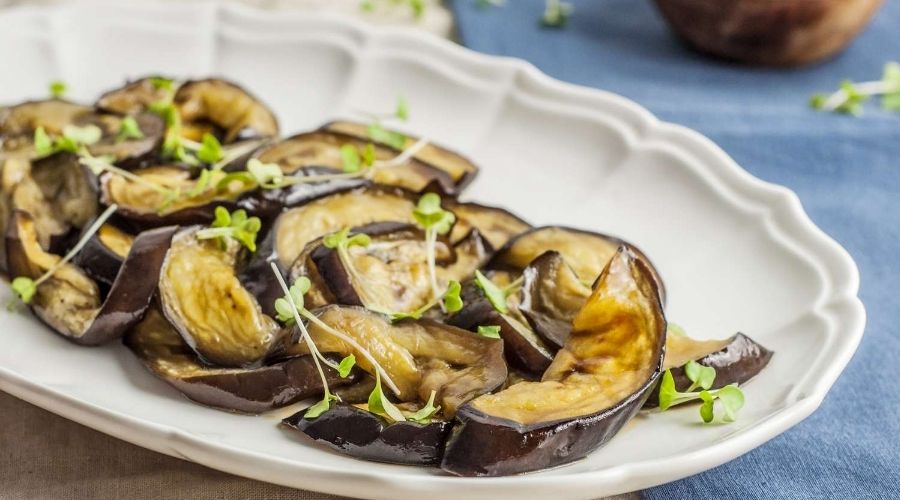Storing cooked eggplant properly is essential for preserving its flavor, texture, and nutritional value.
This versatile vegetable can enhance a variety of dishes, from stir-fries to casseroles, but if not stored correctly, it can quickly spoil or lose its quality.
In this article, we’ll explore the best methods for storing cooked eggplant, ensuring you can enjoy its rich taste and health benefits for days to come.
Whether you’re meal prepping or simply have leftovers, our comprehensive guide will equip you with the knowledge needed to keep your cooked eggplant fresh and delicious.
Why Storing Cooked Eggplant Properly Matters
Storing cooked eggplant properly is essential for preserving its taste, texture, and nutritional value.
When cooked, eggplant can absorb flavors and moisture, making it prone to spoilage if not handled correctly.
Proper storage not only helps maintain its unique, creamy texture but also prevents the development of off-flavors or unpleasant odors.
Additionally, improperly stored eggplant can become mushy or develop a slimy surface, making it unappetizing and unsafe to eat.
By ensuring that cooked eggplant is stored in airtight containers and kept at the right temperature, you can extend its shelf life and enjoy its delicious flavor in various dishes without compromising food safety.
In a world where food waste is a significant concern, effective storage practices allow you to make the most of your cooked eggplant, reducing waste while enjoying its rich culinary potential.
How to Store Cooked Eggplant

Storing cooked eggplant correctly is vital for maintaining its flavor, texture, and safety.
Here’s a complete guide to help you store your cooked eggplant effectively:
1. Cool Down Properly
Before storing, allow your cooked eggplant to cool down to room temperature.
This helps prevent condensation inside the storage container, which can lead to spoilage. Aim to refrigerate the eggplant within two hours of cooking.
2. Choose the Right Container
Use airtight containers made of glass or BPA-free plastic for storing cooked eggplant.
These containers will keep out moisture and odors, ensuring the eggplant stays fresh.
Avoid using metal containers, as they can react with the eggplant.
3. Portion Control
If you’ve made a large batch, consider dividing the eggplant into smaller portions before storing.
This allows you to take out only what you need, reducing the risk of repeated exposure to air and moisture, which can lead to spoilage.
4. Label and Date
Always label your containers with the date of storage.
This practice helps you keep track of how long the eggplant has been stored and ensures you consume it within a safe timeframe.
5. Refrigeration
Store cooked eggplant in the refrigerator if you plan to consume it within 3 to 5 days.
Ensure the refrigerator is set to a temperature below 40°F (4°C) to keep the eggplant safe.
6. Freezing for Long-Term Storage
If you want to store cooked eggplant for a longer period, consider freezing it.
Place the cooled eggplant in freezer-safe bags or containers, removing as much air as possible to prevent freezer burn. Cooked eggplant can be frozen for up to 3 months.
7. Thawing and Reheating
When you’re ready to use frozen cooked eggplant, thaw it in the refrigerator overnight.
Reheat it gently in the microwave, oven, or stovetop, adding a splash of water or oil to restore moisture if needed.
8. Check for Spoilage
Before consuming stored cooked eggplant, always check for signs of spoilage. Look for off smells, discoloration, or a slimy texture.
If you notice any of these signs, discard the eggplant to ensure food safety.
By following these guidelines, you can effectively store cooked eggplant and enjoy its delicious flavor and texture for days to come!
What to Look for While Storing Cooked Eggplant
When storing cooked eggplant, there are several key factors to consider to ensure it remains fresh, safe, and delicious. Here’s what to look for:
1. Cooling Process
Ensure that the cooked eggplant is allowed to cool down to room temperature before storing.
Rapid cooling can cause condensation inside the storage container, which may lead to spoilage.
2. Container Quality
Choose high-quality, airtight containers that are free from any scratches or damages.
Glass or BPA-free plastic containers are ideal, as they prevent odors from permeating and help maintain the eggplant’s moisture levels.
3. Portioning
Consider how much cooked eggplant you plan to use. Storing it in smaller, portion-sized containers can prevent unnecessary exposure to air and moisture each time you open the container, which helps maintain freshness.
4. Labeling
Always label your storage containers with the date of cooking.
This practice helps you track the storage duration and ensures you consume the eggplant within the safe time frame of 3 to 5 days in the refrigerator.
5. Refrigerator Temperature
Make sure your refrigerator is set to a temperature below 40°F (4°C). This is essential for keeping cooked eggplant safe from bacterial growth during storage.
6. Checking for Spoilage
Before storing, inspect the cooked eggplant for any signs of spoilage, such as discoloration, off odors, or a slimy texture. If any of these signs are present, it’s best not to store the eggplant.
7. Moisture Control
While moisture is necessary to keep cooked eggplant from drying out, excess moisture can lead to spoilage.
Ensure that your container is not too moist when sealing it, and consider placing a paper towel inside to absorb any excess moisture.
By paying attention to these factors, you can ensure that your cooked eggplant stays fresh, safe, and ready to enjoy in your favorite dishes!
How to Choose the Right Accessories for Storing Cooked Eggplant

Selecting the appropriate accessories for storing cooked eggplant is crucial for maintaining its freshness, flavor, and texture.
Here are some key considerations to help you make the right choices:
1. Airtight Containers
Opt for airtight containers made of glass or BPA-free plastic. These containers effectively seal in moisture and prevent air exposure, which can lead to spoilage.
Glass containers are especially beneficial because they don’t absorb odors and can be used for reheating.
2. Freezer-Safe Bags
If you plan to freeze cooked eggplant, choose high-quality freezer-safe zip-top bags. These bags allow you to remove excess air, minimizing the risk of freezer burn.
Consider double-bagging for extra protection.
3. Food Storage Wraps
For short-term storage in the refrigerator, you can use plastic wrap or aluminum foil to cover bowls of cooked eggplant.
Ensure the wrap is tightly sealed to limit air exposure. However, it’s best to transfer the eggplant to an airtight container for longer storage.
4. Labels and Markers
Invest in a set of labels and a permanent marker to label your containers.
This practice allows you to note the storage date, helping you keep track of freshness and avoid consuming spoiled food.
5. Vacuum Sealers
For long-term storage, consider using a vacuum sealer.
This appliance removes air from bags, significantly extending the shelf life of cooked eggplant in the freezer while preserving its flavor and texture.
6. Cooling Racks
Using a cooling rack when initially cooling your cooked eggplant can help reduce moisture buildup.
This step is important before transferring the eggplant to storage, as it prevents condensation inside the container.
7. Temperature Control Accessories
If you have temperature control devices, such as a thermometer or a dedicated refrigerator for leftovers, these can help ensure your cooked eggplant is stored at the ideal temperature, further extending its freshness.
By carefully selecting these accessories, you can optimize the storage conditions for your cooked eggplant, ensuring it stays fresh and delicious for your future meals!
How to Tell If Cooked Eggplant Is Bad After Storing
Determining whether cooked eggplant has spoiled is crucial for food safety and quality.
Here are some signs to look for that indicate your cooked eggplant may be bad:
1. Off Odor
If the cooked eggplant emits a sour or unpleasant odor, it’s a clear sign that it has spoiled. Fresh eggplant should have a mild, slightly earthy smell.
Trust your nose—if it smells off, it’s best to discard it.
2. Discoloration
Examine the cooked eggplant for any significant changes in color. If you notice dark brown or black spots that weren’t there before, this could indicate spoilage.
Fresh cooked eggplant should maintain a consistent, vibrant color.
3. Texture Changes
Spoiled cooked eggplant may develop an unusual texture. If it feels slimy, overly mushy, or excessively dry compared to when it was freshly cooked, it’s best to err on the side of caution and throw it away.
4. Mold Growth
Any visible mold on the surface is a definitive sign that the cooked eggplant is no longer safe to eat.
Mold can appear as fuzzy patches of various colors, including white, green, or black. If you see mold, discard the entire container.
5. Taste Test
If the eggplant looks and smells fine, you can taste a small piece. If it has an off or sour taste, do not consume it further.
It’s important to prioritize safety over taste when in doubt.
6. Storage Duration
Keep in mind how long the cooked eggplant has been stored. If it has been in the refrigerator for more than 3 to 5 days or frozen for over three months, it’s safer to discard it, even if it appears normal.
By paying attention to these signs, you can ensure that you consume safe, high-quality cooked eggplant and avoid potential foodborne illness.
When in doubt, it’s always better to be safe and throw it out!
1. How long can I store cooked eggplant in the refrigerator?
You can store cooked eggplant in the refrigerator for about 3 to 5 days.
Ensure it is kept in an airtight container to maintain freshness.
2. Can I freeze cooked eggplant?
Yes, you can freeze cooked eggplant. It can be stored in freezer-safe bags or containers for up to 3 months.
Be sure to remove as much air as possible before sealing.
3. Should I let cooked eggplant cool before storing it?
Yes, it’s important to let cooked eggplant cool to room temperature before storing it. This helps prevent condensation inside the container, which can lead to spoilage.
4. What type of container is best for storing cooked eggplant?
Airtight glass or BPA-free plastic containers are best for storing cooked eggplant. They prevent moisture loss and keep out odors.
5. How can I tell if cooked eggplant has gone bad?
Signs of spoilage include off odors, discoloration, a slimy texture, visible mold, or an unpleasant taste. If you notice any of these signs, it’s best to discard the eggplant.
6. Can I reheat frozen cooked eggplant directly?
Yes, you can reheat frozen cooked eggplant directly.
Thaw it in the refrigerator overnight and reheat it in the microwave, oven, or stovetop. Adding a splash of water or oil can help restore moisture.
7. Is it safe to store cooked eggplant in metal containers?
It’s best to avoid using metal containers for storing cooked eggplant, as they can react with the food and alter its flavor.
Stick to glass or plastic containers for optimal results.
Conclusion
In conclusion, knowing how to store cooked eggplant effectively can help you minimize food waste and enjoy this nutritious vegetable longer.
By following the tips outlined in this article, from proper cooling techniques to choosing the right storage containers, you can ensure your cooked eggplant stays fresh and flavorful.
Remember to keep an eye out for signs of spoilage and to utilize your leftovers in various recipes.
With these practices in place, you can make the most of your cooked eggplant, turning it into delightful meals throughout the week.
References
- https://www.recipetineats.com/roasted-eggplant/
- https://www.alphafoodie.com/how-to-cook-eggplant/
- https://www.wholesomeyum.com/how-to-roast-eggplant/
- https://www.allrecipes.com/roasted-eggplant-recipe-6737745


